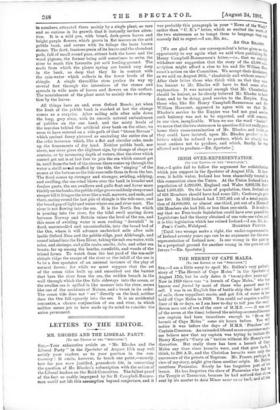LETTERS TO THE EDITOR.
MR. RHODES AND THE LIBERAL PARTY. pro THE EDITOS OF THE " SPECTATOR."1
Sm,—Your exhaustive article on " Mr. Rhodes and the Liberal Party " in the Spectator of August 17th may well satisfy your readers as to your position in the con- troversy ! It omits, however, to touch one point—namely, how far you were justified, prxcedente lite, in connecting the question of Mr. Rhodes's subscription with the action of the Liberal leaders on the Raid Committee. The fullest proof of the fact so rashly impugned by Sir H. Campbell-Banner- man would not lift this assumption beyond conjecture, and it
was probably this paragraph in your "News of the Week,* rather than " C. B.'s " letter, which so excited the wrath nf the two statesmen as to tempt them to language they ml scarcely fail to regret. —I am, Sir, &c., AN OLD READER, [We are glad that our correspondent's letter gives us the opportunity to say again what we said when publishing $ir Henry Campbell-Bannerman's letter,—i.e., that we entirely withdraw our suggestion that the story of the £5,000 snu sc:iption. might afford a clue to his and Sir William flar. court's action on the Committee. We accept their disclaimer as we said on August 10th, " absolutely and without rescue" After their letter those who think with us that they Were .too lenient to Mr. Rhodes will have to find some other explanation. It was natural enough that Mr. Chamberlain should be lenient, as he clearly believed Mr. Rhodes to have done, and to be doing, good service to the Empire. From those who, like Sir Henry Campbell-Bannerman and sir William Harcourt, appeared to agree with us that Mr. Rhodes's service to the Empire was bad not good service such leniency was not to be expected, and still remains, in our view, inexplicable. When we use the word "lenient" we mean that the two statesmen in question did not really prr home their cross-examination of Mr. Rhodes, and insist...; they could have insisted, upon Mr. Rhodes praclue*I-r the letters which he refused' to produce, which be clearly %a; most anicious not to produce, and which, finally, he w,, allowed not to produCe.—En. Spectator.]


































 Previous page
Previous page